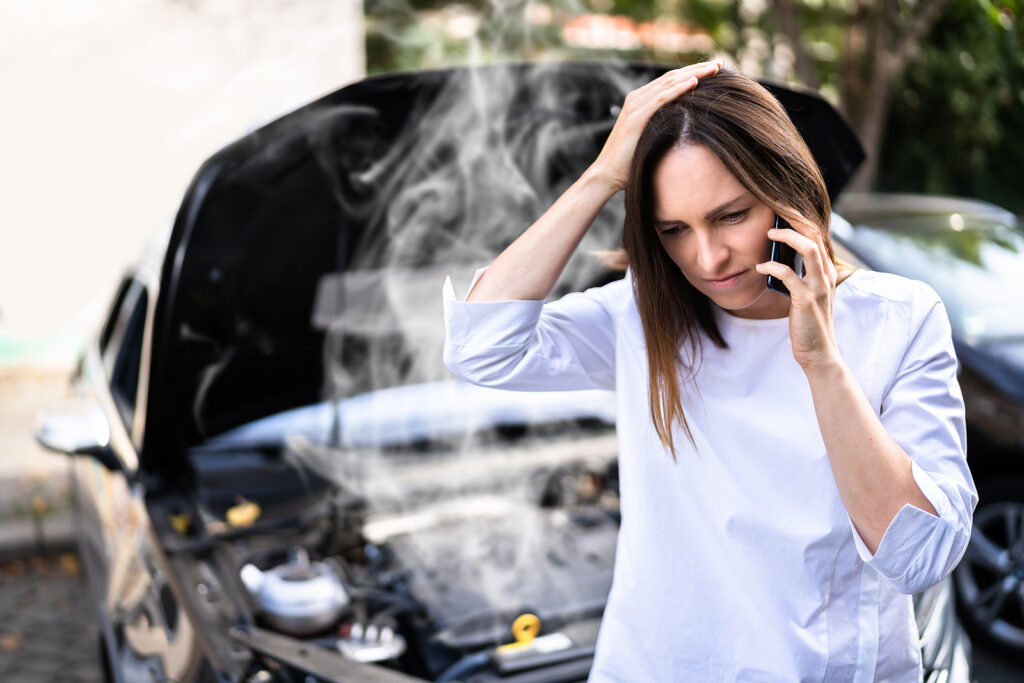Many people assume that if you let the engine cool down, you can drive a car after it’s done overheating. But this is not always a good idea. In some cases, it’s not possible at all. Continue reading to learn what you should do if your car engine begins to overheat, including whether or not you can drive it home or to the auto shop.

Overheating Car Engine Causes
Whether it is safe or not to drive a car after it has overheated largely depends on the underlying cause of the malfunction. Although there are several things that can go wrong within a vehicle that can cause the engine to overheat, there seems to be some more common reasons, like low coolant, clogged car radiator, faulty thermostat, broken fan belt, and defective cooling fan.
Low Coolant
A car can experience low coolant if the coolant has run out or the vehicle has a coolant leak. If you’re coolant simply runs out, it can cause your engine to overheat. If you have an extra bottle of radiator fluid or antifreeze in your car with you, you can simply fill your coolant backup and hit the road once again. Needing a refill on coolant is the only circumstance in which it is okay to drive your car after it has just overheated. In fact, it is recommended to always keep an extra bottle of radiator fluid, also known as coolant or antifreeze, in your car in case you ever run low, especially in the summer when the temperatures are higher, and engines run hotter.
If your car is experiencing a coolant leak, it is not recommended to simply top off the radiator fluid and continue driving. This can cause further damage to the internal components within your vehicle and engine. In this case, it would be recommended to have your vehicle towed home or to the automotive repair shop of your choice.
Defective Cooling Fan
The defective or faulty cooling fan is another common reason why car engines overheat. When a coolant fan isn’t working, it is typically because of a faulty electric fan or a bad radiator switch. Either way, it is not safe to drive a vehicle that is having problems with the cooling fan because it will continue to cause the engine to overheat.
Clogged Radiator
A clogged radiator is another common cause for an overheating car engine. However, this is typically common in older cars or cars with more than 50,000 miles driven.
Broken Fan Belt
A broken fan belt will also cause an engine to overheat in a vehicle. In most cases of a broken fan belt, there are other internal damages happening simultaneously. For this reason, it is not wise to drive a vehicle in this condition. Instead, have it towed home or to an auto repair shop for service.
Faulty Thermostat
A faulty thermostat is another common cause for overheating car engines. But engine gets hot, the thermostat is supposed to open in order to allow more coolant to flow through. If the thermostat is failing to open, the coolant cannot flow through the engine, and will eventually cause the engine to overheat. In this condition, it is not safe to drive a vehicle. You would need to have a towing service transport your vehicle to an auto repair shop of your choice.
Are you currently stuck on the side of the road with an overheating car engine in central Indiana? If so, contact Zore’s Indy at 317-247-8484 for prompt and affordable tow truck assistance in Indianapolis, Indiana. We operate 24 hours a day, 7 days a week, and 365 days a year, including all National holidays.
Related Posts:
Should I Call a Tow Truck if My Check Engine Light Comes On?
What NOT To Do When Your Car Engine Overheats
Advantages of Re-Manufactured Car Engines
